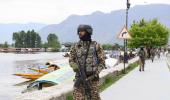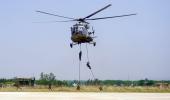'The government has to explain (to the army, air force and navy chiefs) whether they want a punitive strike, a deep punitive strike, or whether they want limited war or an all-out war, will it be a circumscribed war or will it be a shallow attack along the border.'

Dr Ajay Sahni, director of Institute of Conflict Management, is an expert on cross border terrorism having followed this phenomenon closely in the last three decades.
The burning question upper most in the minds of security experts and the Indian-on-the-street is what will the nature and extent of India's attack be on Pakistan to avenge the dastardly killings of 26 innocent tourists in Pahalgam on April 22, 2025.
"This decision remains a political decision. It is the government of the day which has to give a broad indication of what they want," Dr Sahni tells Rediff Senior Contributor Rashme Sehgal.
On Tuesday, Prime Minister Modi held a meeting with the three service chiefs giving them full operational freedom to decide on the mode, targets and timing of the response to the Pahalgam attack.
The security chiefs need a clear mandate on what they are required to do. The mandate for any course of action comes from the political class.
Will it be a punitive strike or should the armed forces be expected to wage an all-out war?
This decision remains a political decision. It is the government of the day which has to give a broad indication of what they want.
Can you elaborate on this?
The government has to explain (to the army, air force and navy chiefs) whether they want a punitive strike, a deep punitive strike, or whether they want limited war or an all-out war, will it be a circumscribed war or will it be a shallow attack along the border.
This will decide the nature of the response and the extent that the armed forces will have to mobilise to launch the attack.
Once this indication is given, the armed forces will need freedom to plan and execute that line of action.
Do you see the likelihood of an all-out war?
This will require full mobilisation of the armed forces and will take a certain amount of time.
Operation Parikrama saw the Indian Army take a month to fully mobilise itself.
The question being asked is whether the Cold Start doctrine has been introduced in the armed forces. (This doctrine has been designed to avoid crossing Pakistan's nuclear red lines through offensive operations with strikes deep into Pakistan but at the same time limiting the application of force to divisional-thrusts across the international boundary.)
If it had been introduced, it should have been operationalised. It seems obvious for the present that so far this is not the case.

How ready are our armed forces?
I do not think it is appropriate to make a comment at this stage. How ready can your armed forces be if you do not invest in them?
The defence budget remains at 1.9 per cent of GDP raising serious questions of long-term capabilities of the armed forces.
If you are not willing to pay for your army, you won't have a ready army. The armed forces have a distinct culture of their own.
It is difficult to train men to die for their country. This requires training and investment.
Look at the way our educational system has been devastated. It is the same with our health delievery systems with people now paying through their nose for private medical services.
A great deal of the defence budget is being diverted to paying pensions of retired defence personnel?
The armed forces have always received pensions in the past also. Tax revenues have gone up over the years and so why should this money not be diverted towards pensioners.
Pensions of members of Parliament have also gone up. No one complains against that.

Why have the armed forces not raised their voices and demanded an increase in their budgetary allocation?
They cannot do so. It is not part of their mandate. Some retired personnel do raise their voices but nine out of ten are hoping for some post-retirement sinecures, and so prefer to stay quiet.
Are you saying the Pakistani army is better prepared than us?
They are more focused. They are in charge of the country and half of the country's GDP is spent on the armed forces.
They have a Fauji Fund which is the amongst the largest business conglomerates in their country and looks after the interests of ex-servicemen.
Every retired officer and jawan receives compensation from this Fauji Fund.
Why then is there such a high level of desertion and mass resignations in the Pakistan army?
A large number of their soldiers are dying in Baluchistan and in the Khyber Pakhtun region. The Pakistan army suffered over 1,000 fatalities in 2024.
In comparison, our security forces suffered 29 fatalites in the same year.
The lowest fatalities our security forces suffered in J&K was in 2012 when 21 of our security personnel died. We have not matched that figure since.

The Pakistan army claims the Indian government has not provided any proof that the Pahalgam attack was sponsored by Pakistan.
How much evidence does Pakistan want? An American court has convicted David Coleman Headley on his role in the 26/11 attack on Mumbai which killed 166 people.
He has given full testimony on the role of the Laskar-e-Taiba and of the Pakistani army officers who were the handlers of these terrorists.
But their defence minister has gone on to claim the Laskar-e-Taiba does not exist. This is like asking a criminal to judge himself.
What will he say? They should admit they have done this but the problem is there is no adjudicatory mechanism to look into their claims and counter claims.

In case of an all-out war, do you see China coming to the assistance of Pakistan?
China is definitely a factor and will continue to support Pakistan though they will not engage directly in giving them support.
In case, the Chinese do decide to mobilise their army on the eastern side, we will have to put half our forces there and that will leave our army that much weaker.
Mobilisation does not mean the Chinese will declare war. It simply means they will move their troops and we will have to deploy our troops there also.
That will leave us in a difficult situation.
Yes.

Do you think we should have put the Indus Water Treaty on hold given that it has survived four wars and decades of cross-border terrorism against India by Pakistan?
The water flows will not stop. As it is, India does not use its entire share of the water that it is entitled to as per the provisions of the Indus Water Treaty.
To cite an example, about two million acre-feet of water from the river Ravi flows into Pakistan unutilised by India.
If we fully utilise the water that is due to us, this will have a deleterious effect on Pakistan but we will be well within our rights to do so.
Pakistan has blocked our run-of-the-river projects which we were well within our rights to execute.
Pakistan had objected to our Kishenganga and Ratle hydroelectric projects but we have been given the green signal by the World Bank to proceed with them.
They had also objected to the Tulbul project and it was suspended in 1987 but the Indian government is reviewing this suspension given Pakistan's failure to rein in terrorism.
If Pakistani farmers will get hurt by this decision, our farmers too have suffered because of the objections raised by Pakistan in creating more dams and irrigation projects on these northern rivers.
India has always been weak in its response to terror.
Feature Presentation: Aslam Hunani/Rediff.com










